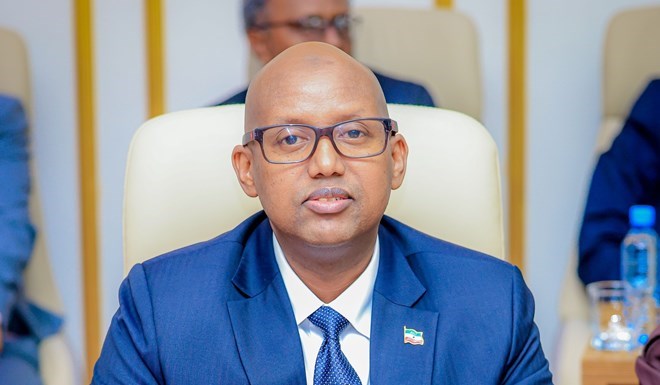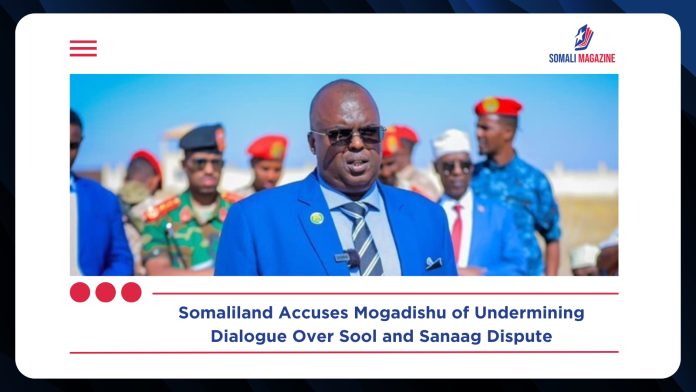Facebook Twitter (X) Instagram Somali Magazine - People's Magazine
Somaliland accuses federal government of undermining dialogue by interfering in Sool and Sanaag regions, reigniting tensions between Hargeisa and Mogadishu and casting doubt on the future of reconciliation efforts. In a strongly worded statement issued Thursday, Somaliland’s Minister of the Presidency, Khadar Hussein Abdi (Looge), accused the Somali Federal Government of violating the foundational principles that have guided decades of dialogue between the two sides.
Speaking from Hargeisa, Looge said the federal government’s recent actions in the disputed territories of Sool and Sanaag amounted to direct interference and had “derailed the process” of peaceful engagement. “The foundation of the talks was mutual respect and equal standing,” he stated. “But when it comes to Las Anod and now Sanaag, the federal government’s involvement has turned into direct interference. That has destroyed the principles on which the talks were built.”
Somaliland, which declared independence from Somalia in 1991 but remains unrecognized internationally, has administered the Sool and Sanaag regions for much of the past two decades. However, the federal government’s recent recognition of the SSC-Khaatumo administration—a local movement seeking federal member state status—has been viewed by Hargeisa as a provocative move that undermines Somaliland’s territorial claims.
Looge emphasized that previous agreements required the federal government to refrain from interfering within Somaliland’s colonial-era borders and to treat negotiations as a dialogue between two equal entities. “I believe that dialogue can be a solution to the long-standing issues between Somaliland and Somalia,” he said, “but unfortunately, the government in Mogadishu has destroyed the principles on which the talks were built.”

The accusation comes amid reports of renewed clashes in Sanaag between Somaliland forces and SSC-Khaatumo fighters, with both sides blaming each other for escalating violence. Somaliland officials have also pointed to Prime Minister Hamza Abdi Barre’s recent visit to Las Anod as a deliberate provocation, arguing that it violated Somaliland’s sovereignty and nullified the basis for further engagement.
In addition to criticizing Mogadishu, Looge confirmed that Somaliland President Abdirahman Mohamed Abdillahi Irro will soon travel to Addis Ababa to meet Ethiopian Prime Minister Abiy Ahmed. The visit is expected to focus on strengthening bilateral ties and reviewing the Memorandum of Understanding signed last year between Somaliland and Ethiopia.
Somaliland’s outreach to Ethiopia comes as a separate agreement between Somalia and Ethiopia—announced in Ankara earlier this year—appears to have stalled. Analysts say the diplomatic realignments reflect a broader geopolitical contest in the Horn of Africa, where territorial disputes and resource access are reshaping alliances.
The federal government has yet to respond formally to Somaliland’s accusations, but officials in Mogadishu have previously defended their engagement with SSC-Khaatumo as part of their constitutional mandate to support federal member states.
Efforts to resume formal talks between Somaliland and Somalia have spanned several decades, often facilitated by third parties such as Turkey, Djibouti, and the United Kingdom. However, no lasting agreements have been reached, and the latest developments suggest that the path to dialogue is narrowing.
As tensions rise, observers warn that continued interference and political maneuvering could destabilize the region further, embolden extremist groups, and derail Somalia’s broader federalization process. For now, Somaliland has drawn a clear line: dialogue is only possible if its sovereignty and territorial claims are respected.

